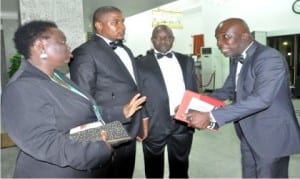Editorial
Returning Peace, Dev To Rivers

L-R: Mrs Ajiboye Adenike, National Vice President, law Students Association of Nigeria, National Open University, Paul Oyemike, President, Bassy Nwibani, National Vice President and Mr Eugene Ogbonna, National Director of Programmes, at the first national grand dinner in honour of law graduates of National Open University in Abuja, recently.
Barely two months after the inauguration
of the present government in Rivers
State, the state capital Port Harcourt has taken a new look, while social and economic activities appear to be taking off again.
Already the “operation zero potholes” campaign has opened hitherto un-motorable areas in the state capital to life through an aggressive roads rehabilitation exercise. In addition to this, gutters are being desilted and illegal markets dismantled.
Another reason why different sections of Port Harcourt residents are now singing the praise of Governor Nyesom Wike is the apparent enthronement of the rule of law and the human face of the administration.
Consequently, the usual un-certainty that held the population captive and stifled the economy of Rivers State is fast losing grip. Coupled with the release of three months salary within a month, the gridlock is broken. Clearly, Governor Nyesom Wike is making history so soon.
As we join other well meaning people of Rivers State to appreciate the Governor and to wish him well, we think that if the present tempo and philosophy is sustained, Rivers State will soon be seen as belonging to a people, while the existence of a government will no longer be in doubt.
We are particularly proud of the ingenious step taken by Governor Wike to involve the private sector in the reconstruction of the Eleme / Onne end of the East/West Road. This road that had defied the efforts of successive administrations in Rivers State and the Federal level is now going to be a reality.
The present administration has also shown its preparedness to re-open industrialization in Rivers State. The only Industrial district in Port Harcourt that had been in-accessible for many years will soon bubble as the Trans-Amadi Road is being rehabilitated.
By the time the Eleme / Onne Road supports business at the Federal Ocean Terminal, the Petrochemical company, the Refinery, the fertilizer company among others more jobs will be created. Similarly the re-opening of the Trans-Amadi Industrial Area will support the firms there.
The bottom line is that more hands will be engaged and the prospect for peace enhanced while the development of Rivers State would also receive a fresh impetus. These are some of the few things the ordinary people and the business community need to function.
When the present government promised to give Rivers a new face, many people took it for a political talk. But in so short a time we are beginning to lose count of the achievements of the administration. The world need more people who can honour their words and Governor Wike has proven himself to be one of the rare humans.
It is on record that this administration has taken on projects that others fear to take on. For the first time a government has taken steps to complete work on the road to Eagle Island. Similarly the Iwofe Road that had been severally described as the worst road in Nigeria is now under works.
We know that only a home boy that knows the real plight of the Rivers man could have done this. Even more humbling is the fact that this is being done at a time of extreme economic pressure in Rivers State.
At a time other states are still struggling to pay salaries, in fact, many of the new administrations that are not being distracted by electoral tribunals are still at the planning stage, but Governor Wike hit the ground running and giving Rivers people reasons to thank God for voting for him.
If for nothing else, it is expected that Rivers people, no matter their party affiliation or ethnic group should rally round the Governor Wike’s administration and take advantage of this passion to take the development of the people and the State to the next level.
Editorial
Beginning A New Dawn At RSNC

Editorial
Sustaining OBALGA’s Ban On Street Trading

Editorial
AFCON ’25: Bravo, Super Eagles, But…

-

 Politics3 days ago
Politics3 days agoAPC Releases Adjusted Timetable For Nationwide Congresses, Convention
-
Sports3 days ago
DG NIS Wants NSC Board Constituted, Seeks Increased In Funding
-

 Business3 days ago
Business3 days agoCustoms Seek Support To Curb Smuggling In Ogun
-

 Sports3 days ago
Sports3 days agoSWAN Rivers Set-up Five Functional Committees
-

 Featured3 days ago
Featured3 days agoINEC Proposes N873.78bn For 2027 Elections, N171bn For 2026 Operations
-
News3 days ago
Police Bust Kidnapping Syndicate In PH
-
Sports3 days ago
NSC Disburses N200m Training Grants To 26 Athletes
-
Sports3 days ago
‘NTF Will Build On Davis Cup Success For Brighter Future’

